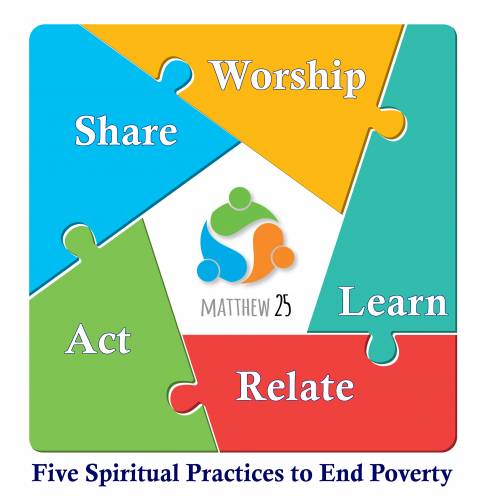To return to the overall Matthew 25 Eradicating Systemic Poverty page, click here.
To download PDFs of PC(USA) Resources list and Action Suggestions organized by the Five Spiritual Practices (worship, learn, relate, act, share), please click here.
In our Christian education and personal learning, we will seek to understand the intersectional, systemic, and root causes of poverty.
Learn Resources
- Use the Hunger Action Congregation program to engage your church in six areas of church life to end hunger and address its root causes.
- Personally or with a small group, use the Study and Devotional Guide that explores the globally recognized Sustainable Development Goals (SDGs), guide created by the Presbyterian Ministry at the United Nations.
- Explore the poverty section of the Companion Guide to the Commitment to Peacemaking in order to support your congregation in an in-depth season of walking alongside the systemic issues of poverty—find links to children’s resources, adult study and worship resources, advocacy organizations, suggestions for hymns and using our Confessions, and much more.
- Include children in your education about poverty, hunger and its root causes. Use “Not a Game-Hunger” for interactive learning on real-life impact of hunger; invite youth to participate in creating a Souper Bowl of Caring Sunday; use Hunger Program youth and children resources and adapt to your context.
Learn Action Suggestions
- Invite local partner organizations to speak to the congregation about the root causes of poverty that they seek to address, for Sunday School, Wednesday night suppers, etc. Be mindful that you might want to expand your circle of local partners working to end poverty, to include unexpected partners like the health department or a school of social work. Be mindful of which partners you can invest longer-term relationship building in, and which you are hosting simply to unpack some complexities around poverty in your region as a one time educational event. Be clear what compensation or honorarium might be offered for speaking engagements versus what relationships/partnership work might grow out of connections.
- Offer simulation activities and other active learning models. Be mindful to include “now what” or “next steps” to engage participants in some type of action that stems from the learning activity (i.e. a local organization to support, a local or national piece of legislation to call decision-makers about, etc.)
- racial wealth gap simulation from Bread for the World, bread.org/library/racial-wealth-gap-learning-simulation
- the PC(USA) Africa game about children’s education challenges, contact World Mission’s Africa Office at 800-728-7228, ext. 5031. Read more at presbyterianmission.org/story/helping-africas-children-pns/.
- Use Hunger meal simulations to raise awareness and discuss hunger concerns. For suggested outlines of such meals, email php@pcusa.org.
- For more traditional learning opportunities, see PMA Resources on Poverty for suggested study guides, curriculum and books
- Attend visits/travel delegations to other communities (local or global) to raise understanding and build relationships, being mindful not to be in a tourist mindset but to enter into space as a learner willing to be transformed in order to act to end poverty
- Presbyterian Peacemaking Program travel delegations in Feb 3-17, 2023 Hong Kong and Philippines with a focus on forced migration and labor trafficking, Mar 13-20, 2023 to Puerto Rico, and Apr 28-May 7, 2023 with a focus on native lands in the American Southwest.
- Find upcoming campaigns or rallies for state or national Poor People’s Campaign
- Use the map on the One Great Hour of Sharing page to locate partners that may be willing to receive visits
 To see resources and action steps for other spiritual disciples of eradicating poverty and building communities of well-being, click on one of the other practices. To return to the overall Matthew 25 Eradicating Systemic Poverty page, click here.
To see resources and action steps for other spiritual disciples of eradicating poverty and building communities of well-being, click on one of the other practices. To return to the overall Matthew 25 Eradicating Systemic Poverty page, click here.
